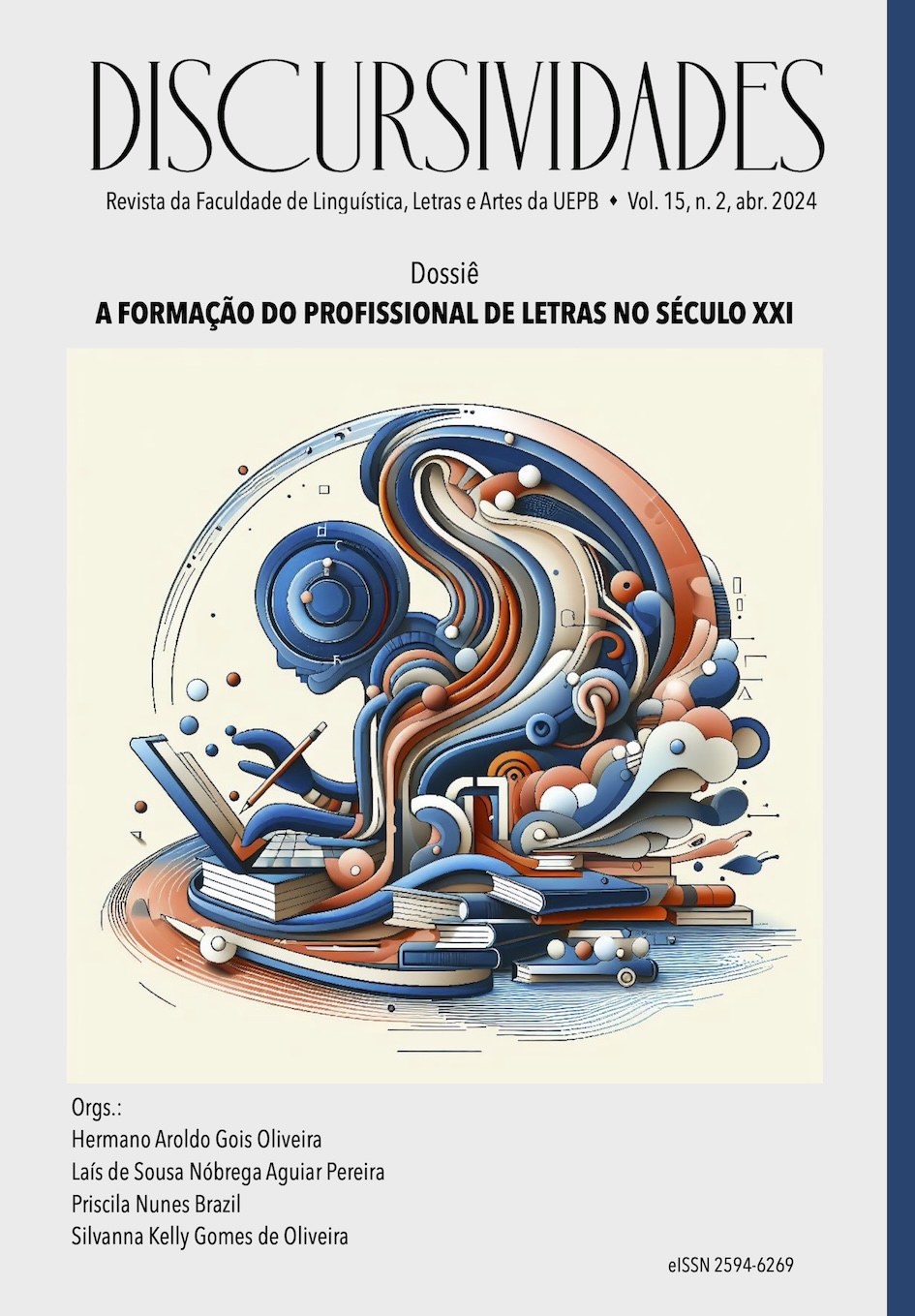The conflicts experienced in the context of the Pedagogical Residency Program/Portuguese: residents' revelations about their initial teaching experiences
DOI:
https://doi.org/10.29327/256399.15.2-3Keywords:
Conflicts. Pedagogical Residency Program. Initial Training. Applied Linguistics.Abstract
Programs aimed at initial teachers training such as the Pedagogical Residency Program (PRP), emerge to strengthen future teachers' performance (Brasil, 2002). In this scenario, the present paper intends to analyze conflicts experienced by two residents when reflecting, in an experience report, about their first experiences working in a basic education group. Specifically, it is intended: to investigate the conflicts established among "I" (residents) and the "other" (students and teachers) and with the object (Portuguese teaching and reduced class time); and to evaluate aspects of survival and discovery (Huberman, 1995), which involve career's beginning, in PRP/Portuguese. The theoretical support for this discussion, of qualitative-interpretative nature (André, 2013), was sheltered by Applied Linguistics (AL) (Moita Lopes, 2009), in the initial years of teaching (Huberman, 1995); and in the conflicts involving the work (Clot, 2010; Cristóvão; Fogaça, 2008). Analysis has revealed that in the conflicts with the “other”, residents have survived to students' little interaction, however they have discovered, through teachers' feedback, that being a teacher goes beyond giving classes; and, in the conflicts with the object, they have perceived the need to deepen grammatical knowledge and adapting planning to classes' reduced time in the school.
References
ANDRE, M. O que é um estudo de caso qualitativo em educação?. Revista da FAAEBA: Educação e Contemporaneidade [online], vol.22, n.40, p. 95-103, 2013.
BRASIL. Diretrizes Curriculares Nacionais para a Formação do Professor. Resolução CNE/CP 1/2002, de 18 de fevereiro de 2002. Diário Oficial da União, Brasília, DF, 9 de abril de 2002. Seção 1, p. 31.
______. Edital de chamada pública para apresentação de projetos institucionais n. 024/2022. [Programa de Residência Pedagógica. Coordenação de Aperfeiçoamento de Pessoal de Nível Superior (CAPES)]. Disponível em: chrome-extension://efaidnbmnnnibpcajpcglclefindmkaj/https://www.gov.br/capes/pt-br/centrais-de-conteudo/editais/29042022_Edital_1692979_Edital_24_2022.pdf. Acesso: 11/11/2023.
COSTA, M. de O.; SILVA, L. A. da.. Educação e democracia: Base Nacional Comum Curricular e novo ensino médio sob a ótica de entidades acadêmicas da área educacional. Revista Brasileira de Educação, v. 24, 2019. Disponível em: < https:// doi.org/10.590/S1413-24782019240047 >. Acesso em: 13 dez. 2023.
COSTA-HÜBES, T. C.; SIMIONI, C. A. Sequência didática: uma proposta metodológica curricular de trabalho com os gêneros discursivos/textuais. In: BARROS, E. L. D; RIOS-REGISTRO, E. S. (org.). Experiências com sequências didáticas de gêneros textuais. Campinas: Pontes Editores, 2014. p. 15-39.
CLOT, Y. Trabalho e poder de agir. Trad. Guilherme João de Freitas Teixeira e Marlene Machado Zica Vianna. Belo Horizonte: Fabrefactum, 2010.
_________. A função psicológica do trabalho. Tradução de Aldair Sobral. São Paulo: Vozes, 1999.
CRISTOVÃO, V. L. L.; FOGAÇA, F. C. Desenvolvimento: um conceito constitutivo do gênero profissional docente. In: CRISTOVÃO, V. L. L. (org.) Estudos da Linguagem à luz do Interacionismo Sociodiscursivo. Londrina: UEL, 2008, p. 13 - 33.
HUBERMAN, M. O ciclo da vida profissional dos professores. In.: NÓVOA, A. (org.) Vida de professores. 2. ed. Porto, Portugal: Porto Editora, 1995, p. 33-61.
MACHADO, A. R. Por uma concepção ampliada do trabalho do professor. In: GUIMARÃES, A. M. de M.; MACHADO, A. R.; COUTINHO, A. (Org.). O interacionismo sociodiscursivo: questões epistemológicas e metodológicas. Campinas: Mercado de Letras, 2007, p. 77-97.
MOITA LOPES, L. P. da. Da aplicação de Linguística à Linguística Aplicada Indisciplinar. In: PEREIRA, R. C.; ROCA, P. (orgs.) Linguística aplicada: um caminho com diferentes acessos. São Paulo: Contexto, 2009, p. 11-24.
_________. Pesquisa interpretativista em linguística aplicada: a linguagem como condição e solução. Delta: Documentação e Estudos em Linguística Teórica e Aplicada, São Paulo, v. 10, n. 2, p. 329-338, 1994 .
PERES, R. S.; SANTOS, M. A. Considerações gerais e orientações práticas acerca do emprego de estudos de caso na pesquisa científica em Psicologia. Interações, v. X, n. 20, p. 109-126, jul./dez., 2005.
PIMENTA, S. G.; LIMA, M. S. L. L.. Estágio e Docência. 4. ed. São Paulo: Cortez. 2009.
SANT’ANA, T. F.. A (re) construção da identidade docente no percurso estagiária - professora iniciante de Língua Portuguesa. Tese 304f. (Doutorado em Linguística Aplicada). Universidade Federal da Paraíba – UFPB, João Pessoa, 2016. (inédita)
SIGNORINI, I.. O gênero relato reflexivo produzido por professores da escola pública em formação continuada. In.: _____. (org.). Gêneros catalisadores: letramento e formação do professor. São Paulo: Parábola Editorial, 2006, p. 53-70.
TARDIF, M. Saberes docentes e formação profissional. Petrópolis, RJ: Vozes, 2014.
Downloads
Published
How to Cite
License
Copyright (c) 2024 Tatiana Fernandes Sant’ana; Tierry Mahon; Emanoella Barros Casulo

This work is licensed under a Creative Commons Attribution 4.0 International License.
Authors who publish in this journal agree to the following terms:
a) Authors retain copyright and grant the journal the right of first publication. The articles are simultaneously licensed under the Creative Commons Attribution 4.0 International Public License (CC BY 4.0) which allows the sharing of the work with acknowledgment of its authorship and initial publication in this journal.
b) Discursividades journal offers immediate free access to its content, following the principle that making scientific knowledge available to the public free of charge provides greater global democratization of knowledge.






